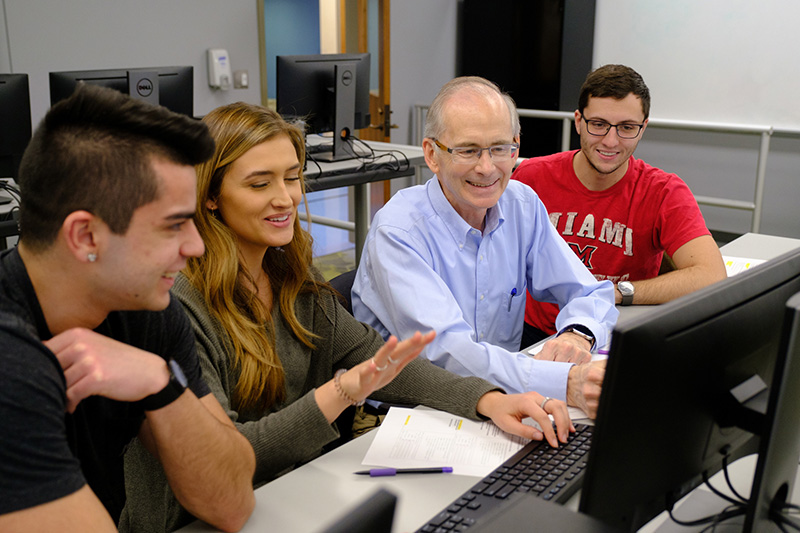Tom Crist and James Kiper awarded Miami University's Benjamin Harrison Medallion
Tom Crist, professor and chair of biology, and James Kiper, professor of computer science and software engineering, have been honored with the 2021 Benjamin Harrison Medallion.
Tom Crist and James Kiper awarded Miami University's Benjamin Harrison Medallion
Tom Crist, professor and chair of biology, and James Kiper, professor of computer science and software engineering, have been honored with the 2021 Benjamin Harrison Medallion. Named for America’s 23rd president who graduated from Miami in 1852, the medallion is Miami University’s most prestigious career faculty honor and recognizes “contribution to the education of the nation.”
Beyond their nationally and internationally recognized research and commitment to teaching, each has served as department chair and in other university leadership roles. They are noted by their colleagues for their calm, collaborative leadership styles.
They will receive the Harrison Medallion from Miami President Gregory Crawford in a ceremony in the fall (rescheduled from this spring due to COVID-19).
Tom Crist
Innovative research in biodiversity and ecology; natural leader; talent for helping students

Tom Crist in the Pearson Hall lobby. His "calm demeanor" and leadership was invaluable during the four-year renovation of the building, his colleagues said. (images by Scott Kissell).
Crist is a natural leader who “makes everyone feel valued and listened to,” a nominator said. Whether commenting on his service to the profession or to Miami, or working with research collaborators, nominators pointed out Crist’s “thoughtful leadership;” how he “softens the edges of difficult discussions with his easy warmth and humor;” and how “aside from his first-rate research, Crist is known for his level-headed and thoughtful leadership style.”
Crist is considered a “world leader in the quantitative study of the patterns and processes by which biodiversity is distributed across landscapes,” a nominator said. His research program addresses a central question in ecology, focused on biodiversity and put simply, “why are there so many different kinds of plants and animals on earth?”
He has developed conceptual and analytical tools that help to understand how biodiversity responds to habitat fragmentation, invasive species, agriculture and other human influences.
The diversity and breadth of Crist’s scholarly record within the field of ecology is impressive, and he has shaped entire swaths of the field, a nominator said.
His approach to science is innovative, relevant to key components of ecological theory and has relevance to conservation biology, another nominator said, adding, “I can think of only a couple of scholars in the field who consistently contribute such profound papers, with both theoretical and practical import.”
Among his more-than 100 publications, three of Crist’s papers published in the past 10 years have each been cited more than 1,200 times. “Truly, only the very best in the field can boast of such amazing publication statistics,” a nominator commented.
His research has been funded by the National Science Foundation (NSF), the U.S. Fish and Wildlife Service, the U.S. Department of Agriculture, the Ohio Department of Natural Resources and the Ohio Environmental Protection Agency. His work has also been supported by non- governmental agencies including The Nature Conservancy and National Geographic Society, underscoring the importance of his research to basic science, to agriculture and to conservation practices.

Crist with students in his invertebrate zoology class at Miami's Ecology Research Center. He is a world leader in the quantitative study of the processes by which biodiversity is distributed across landscapes, a nominator said.
Crist’s commitment to educating and training students of all levels is evident in the breadth of his teaching portfolio and his consistently high teaching evaluations — including several perfect 4.0 scores.
His success in the classroom stems from his calm and gentle demeanor which makes him easy to approach, and he “has a talent for understanding where a student is coming from and helping them succeed on their own terms,” nominators said.
“Many of our students develop an unexpected enthusiasm for quantitative ecology,” thanks to Crist, nominators said, as evidenced by the “huge number of students who select Dr. Crist for their graduate advisory committee; even students in very different areas of biology, and other departments, will ask him to be a member of their masters or PhD committee.”
His set of traits as “incredible ecologist and wonderful leader” led the top professional organization in his field to appoint Crist to the Ecological Society of America’s National Policy Office Rapid Response Team, a nominator said. Since 2012, he has helped provide science-based input on national public policy and media issues related to the environment.
He has also been an editorial board member for the journals Frontiers in Ecology and the Environment (2010-2016), Insect Conservation and Diversity (2011-2014) and Ecology Letters (2006-2011), among others.
His service to Miami includes chair of the Natural Areas Committee since 2016; member of the planning committee for the Clinical Health Sciences and Wellness facility; and chair of the Sustainability Committee from 2013-2016.
Crist, who has served as chair of the biology department since 2015, provides “a climate of trust to our large and diverse department,” nominators said.
When the pandemic hit and campus was ordered closed in March 2020, just as the final laboratory transitions from the renovation were scheduled, “Crist kept his cool and worked to develop alternative plans to finalize the renovations and the last set of laboratory relocations within the locked down world we are all too familiar with,” a nominator said.
Jim Kiper
Software engineering expertise; dedicated to increasing women and minorities in STEM; "phenomenal leadership"

Jim Kiper is an expert in software engineering and in developing tools and methods for improving computer science and software education.
Kiper, who joined Miami in 1986, was the first in his department to receive funding from the National Science Foundation. Characteristic of his commitment to teaching, that NSF award allowed the department to obtain modern workstations, said Cathy Bishop-Clark, associate provost and dean of Miami University Regionals.
“When we began teaching programming in 1989, we taught these courses in lecture rooms without computers. Jim was instrumental in introducing faculty to a more active type of learning in the classrooms through the use of computer laboratories. To this day, I believe Jim’s work had a profound effect on the faculty, students, and the university,” said Bishop-Clark, who is also a professor of computer and information technology.
Kiper is widely known as an expert in the areas of software engineering, software risk assessment and mitigation, and software design rationale. His collaborations with NASA’s Jet Propulsion Laboratory (JPL) led to his being first in the department to receive research funding from NASA.
With collaborators from JPL, Kiper’s research involved software development and its risks to a broader perspective in the development of NASA’s complex spacecraft, a nominator said. “I believe that the collaborations I have had with professor Kiper have been productive and valuable to our nation’s space exploration, thanks to not only his expertise in areas of software, risk, clustering and visualization, but, of no less importance, his demeanor and professionalism that make it such a joy to work with him.”
Kiper’s current research focus is on developing tools and methods for improving computer science and software education. In the past 10 years he has received approximately $1.4 million in NSF funding for projects including the use of various learning and engagement strategies in a cyberlearning environment to improve students’ skills in software development. He is widely known for applying research into classroom teaching and education, several nominators said.
Several of these collaborative research grants are directly aimed at helping to increase women and minority participation in engineering and computing.
Kiper has served on the steering committee for the NSF/Ohio Louis Stokes Alliances for Minority Participation (LSAMP) program and has been the principal investigator at Miami for five-year LSAMP grants funded from 2013-2018 and 2018-2023. The LSAMP program aims to increase STEM baccalaureate and graduate degrees awarded to underrepresented populations.

Kiper's deep and steady commitment to a liberal education is perhaps his biggest contribution to Miami, a nominator said (image pre-COVID-19).
The LSAMP program at Miami has resulted in many success stories, a nominator said, including increases in underrepresented minority (URM) STEM enrollment, retention, and graduation.
Kiper is not only an excellent researcher: His deep and steady commitment to a liberal education is perhaps his biggest contribution to Miami, a nominator said. “Kiper is an excellent teacher who has taught virtually every CSE course the university offers from the 100 level to graduate level,” the nominator said.
A unique example is the art competition, now in its seventh year, he initiated between his department and Miami art students. Winners are paid for their artwork, which is then displayed in Benton Hall for students, faculty, staff and visitors to appreciate.
Kiper led an “explosive growth” in the department during his service as chair of computer science and software engineering (CSE). Between 2010 and 2020, the number of CSE majors increased from 225 to nearly 900, and the number of full-time faculty grew from 12 to nearly 30. “This growth has had a great deal to do with Jim’s overall leadership,” a nominator said, “by attracting and retaining a strong faculty and building a strong relationship with alumni.”
Kiper’s service to the university is “nothing short of phenomenal,” a nominator said. “He did not just ‘serve’ on committees, he led the development of the university's strategic plan, he changed the way the university approves curriculum. His contributions are numerous, deeply impactful, and broad.”
He co-led, with former Provost Phyllis Callahan, the Miami 2020 Strategic Plan task force. Currently, he serves on the University Senate’s Fiscal Priorities and Budget Planning Committee. He has served nine years on the University Senate, on the Liberal Education Council, the Council on Diversity and Inclusion, the Graduate Council, the Regional Campus Process Committee, Liberal Education Revision Task Force, and the Top 25 Courses committee.
Kiper is “a shining example of collaborative leadership and service with people he leads and people he reports to,” a nominator said. “Over the course of more than three decades, Dr. Kiper has made extraordinary and sustained contributions to teaching, research, and service at Miami University.”
